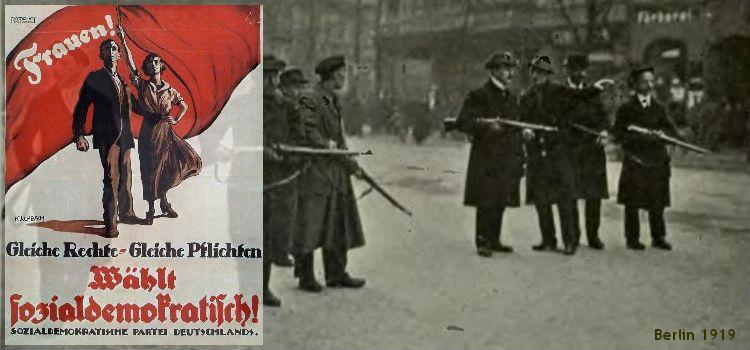
[Germany, 1918/19] Kathi and Max were fond of each other, and at Christmas, the Bergmanns invited him to their home. Much was happening in these days, and they anxiously followed the events in the capital Berlin.
Parliamentarian Democracy or Council Republic?
The Majority Social Democrats and the Independent Social Democrats and formed a revolutionary governement, the Council of People’s Deputies. However, their ideas about Germany’s future form of government and economic order diverged widely. Ebert and his SPD wanted a parliamentarian democracy, whereas the left-wing parties claimed a Council Republic.
Ebert must have hated being at the top of a revolutionary government, he distrusted the Councils of Workers’ and Soldiers and struggled to prevent a social revolution that might lead to a Bolshevik overthrow as in Russia. Yet, a congress of the German workers’ and soldiers’ councils hold in December in Berlin voted against a council system. In contrary, they also wanted elections to a national assembly that should decide about the future state system. Thereupon, the left-wing Spartacists around Karl Liebknecht and Rosa Luxemburg founded the Communist Party of Germany (KPD) at the end of 1918.
Blood is shed
At the end of 1918 and in January 1919, blood was shed. On Christmas Eve, a bloody fight raged between revolutionary sailors and Reichswehr troops. Ebert, struggling to avoid a left-wing overthrow at any rate, had decided to cooperate with the old elites and given the military orders to restore order.
After that, Haase and the two other Independents left the government on 29 December in protest. In other words, the ong hoped for unity of Majority and Independent Social Democrats broke apart. On one hand, thi was a political victory for Ebert who could replace the annoying Independents by his men, among them Gustav Noske as Defense Minister. On the other hand, he paid a high price. Many SPD supporters felt betrayed by his policy, considered him a traitor, and changed over to the Independents or even the Communists.
In the eyes of most military leaders, Ebert and Noske came in handy for the time being. Noske supported the raising of Free Corps, right-wing paramilitary militias who fought for the Republic in the Baltic region and were ready to fight against Bolshevists. Yet, they could not wait for the day when they would get back to power, put the republicans on trial and find them guilty.
January Uprising in Berlin
On January 4, 1919, the Prussian government dismissed Berlin’s police chief, Emil Eichhorn (Independent SPD), for siding with the insurgents during the Christmas crisis. Therefore, Karl Liebknecht (KPD) and other left-wing politicians called for a protest action the next day. Half a million people responded to the call, and many of them were armed.
Then the mass demonstration turned into an armed uprising. Revolutionary demonstrators occupied the Berlin train stations and stormed the newspaper district with the editorial buildings of the bourgeois press and the SPD’s “Vorwärts”, for some newspapers had called not only for the formation of more Free Corps but also murdering the Spartacist leaders. Now Karl Liebknecht called for an armed attack to overthrow of the government. But he had misjudged the situation, for most people had taken to the streets for Eichhorn, not for a violent Communist overthrow.
Independent SPD leaders struggled to mediate between the extreme lefts and Ebert. While they were talking, workers discovered a flyer published by “Vorwärts” entitled “The hour of reckoning is coming soon!”. Moreover, they found out that more Free Corps were being hired. Indeed, Ebert had ordered Reichswehr minister Gustav Noske, to do so on January 6. The talks broke off, the Spartacists called on their members to engage in armed combat.
Ebert gave Noske the order to use government troops to put down the uprising. For days, heavy fighting raged in Berlin between the left-wing extremists and the troops. Eventually, anti-Republican Freikorps moved into the city. These former soldiers still had weapons and military equipment from World War I, which gave them a formidable advantage. They were extremely brutal, often shooting squatters after they had already given up. After the capture of the Berlin police headquarters a day later, the January uprising collapsed; it had claimed 165 victims.
Liebknecht and Luxemburg are murdered
Rosa Luxemburg and Karl Liebknecht had to fear for their lives, but both did not want to leave Berlin. On the evening of January 15, they were discovered in a Berlin-Wilmersdorf apartment, arrested and handed over to the largest Freikorps unit, the heavily armed Garde-Kavallerie-Schützen-Division commanded by Captain Waldemar Pabst. That same night, both prisoners were murdered. Rosa Luxemburg’s body was thrown into the Landwehr Canal, where it was found on 1 July. Karl Liebknecht’s body was delivered anonymously to a morgue.
Many years later, Pabst boosted that “he had them executed”. After his death, a copy of a letter from 1969 was found in his estate, which reads:”That I could not carry out the action at all without Noske’s consent [..]”
The center-left “Weimar Coalition”
On January 19, 1919, the elections for the National Assembly took place. For the first time ever, also women had the right to vote. The Bergmann ladies could not wait to go and vote. Although the SPD became the strongest faction in parliament, it did not obtain the majority it had hoped for. So Ebert and his Social Demorats entered into a coalition with the Center Party and the liberal German Democratic Party, the so-called “Weimar Coalition” of 1919. In the opposition where the Independent Social Democrats and the Communists, the moderate-conservative DVP and the right-wing DNVP.
In the evening, Kathi met with Max. He was disappointed about the Independents’ poor results, but not surprised. “We are a young party,” he said, “still hardly organized. Moreover, very heterogeneous, for many it is perhaps not clear what the Independents actually stands for. Different people say different things. Maybe it’s easier to be an extremist and say extremist things, but not take over any responsibility, but that’s not what our people want us to do. They want the republicans to work together to make our young republic strong, rather than leave it to the communists on one side and the Kaiser’s militarists and state scoundrels on the other. Haase is an idealist; he tried to mediate in the Berlin uprising until the very end. Ebert and Noske, however, remained tough as nails.”
Germany is not in peace
Do you think our country will find peace now?” asked Kathi, “after all, many people went to vote, 83%, I wouldn’t have expected that at all, as low as many value parliamentary democracy.” Max was silent for a while, then said thoughtfully, “I hope so for all of us. Haase still hopes to reconcile and cooerate with the Majority Social Democrats. Yet, I don’t believe so. It’s only a few days ago that the Freecorps murdeded Luxemburg and Liebknecht, and as it seems, Noske knew about it and did not stop them.”
“These Free Corps,” Kathi asked, “what kind of people are they?” Max hesitated a little. “The war has changed us all a lot,” he said slowly, “we have to be careful with what we say about others. The Free Corps are paramilitary groups of disillusioned wartime soldiers. Disconnected from civilian life, these uprooted men know only war and may seek stability within a military structure.
But they are over 400,000 strong, heavily armed and extremely violent. They believe that the men at the front were betrayed by their countrymen. Those who instigated strikes in the armament industry. So they loath them all, they want some form of revenge on those they considered responsible for the armistice. They have been set up with counterrevolutionary intent, partly financed by big industry. Many murders and illegal executions are on them, with Noske’s approval, I assume. I’m sure that most of the generals cannot wait for the day when the republic will be history. And they fight with the brutality they bring from the front, even against civilians. No mercy, no quarter.”
More fighting
Max was to be proven right. When street fighting broke out again in Berlin in March, Reichswehr Minister Noske ordered the Free Corps to shoot every man with a gun in his hand on sight. Some 1,200 people were killed in these days, among them many unarmed and innocent bystanders. The KPD leader Leo Jogiches, Rosa Luxemburg’s love, was shot in the back after his arrest. The leaders of the Majority Social Democras had given orders to fire at their own people. Political enmity became hatred. The Left would never join forces again, not even later to stop Hitler.
In Munich, Prime Minister Kurt Eisner of the Independents was assassinated. In Berlin, Saxony, the Rhineland, and the Ruhr area general strikes and heavy fighting made the first years of the Weimar Republic almost civil-war-like.

Be the first to comment